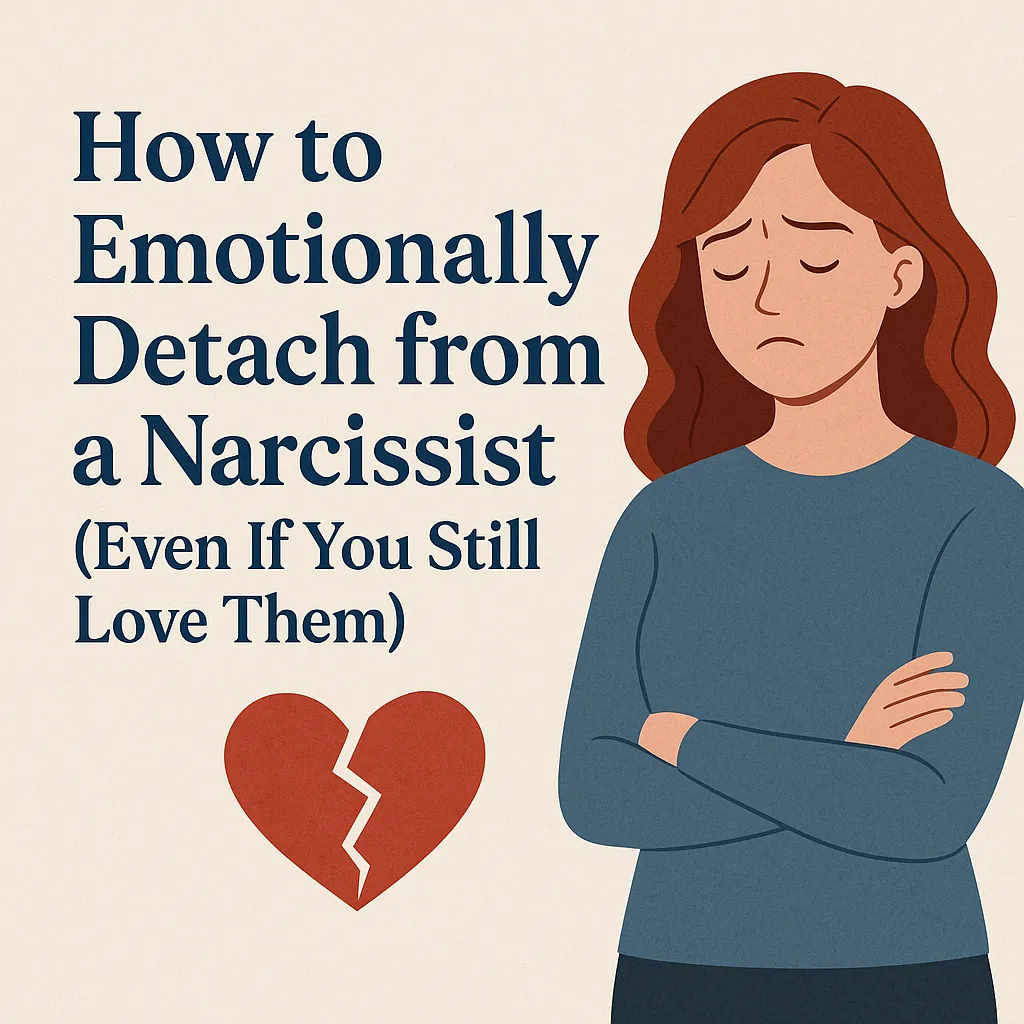How to Emotionally Detach from a Narcissist (Even If You Still Love Them)
❤️ Why Letting Go Feels So Hard
Letting go of a narcissist is not like any ordinary breakup. It’s not just about ending a relationship — it’s about disentangling your self-worth from someone who likely manipulated, gaslit, and emotionally drained you. If you're an empath or someone deeply sensitive to others’ needs, detaching from someone you still love feels almost impossible.
The emotional bond you feel is real. The longing is real. But so is the damage. And acknowledging this duality — love and pain — is the first step to freedom.
🧠 Understanding Trauma Bonding
Trauma bonding is a psychological response to repeated cycles of abuse followed by intermittent reinforcement — think affection, apologies, or love bombing. When a narcissist alternates cruelty with charm, your brain becomes chemically addicted to the hope of "good times" returning.
This creates confusion, loyalty to someone harmful, and a paralyzing fear of letting go — even when you know they’re not good for you.
“Why can’t I just leave?”
It’s not weakness. It’s a trauma response — and it can be healed.
❌ Why Narcissists Don’t (and Won’t) Change
Narcissists often lack the self-awareness or desire to genuinely change. Their need for control, admiration, and superiority typically outweigh any true empathy or accountability. They may promise change, show remorse temporarily, or shift blame onto others — but the cycle continues.
- They manipulate your emotions to keep you attached.
- They rarely seek therapy unless it's court-mandated or image-driven.
- Even if they do change behaviors briefly, the core dysfunction remains untouched.
Understanding this reality is vital — because holding onto the hope of change only extends your suffering.
🧘♀️ 9 Steps to Emotionally Detach (Even If You Still Love Them)
1. Acknowledge the Abuse
Gaslighting often makes victims question if the abuse was even real. Keep a journal of events, feelings, and emotional reactions. Recognizing manipulation, disrespect, or cruelty is the first courageous step toward detachment.
2. Identify the Lies You’ve Believed
Narcissists are skilled at weaving narratives: “No one else will love you,” “You’re too sensitive,” or “You need me.” Begin challenging these internalized beliefs. Ask yourself: Would I say this to my best friend?
3. Grieve the Version of Love You Thought You Had
You may be mourning the potential of what the relationship *could have been*, not what it truly was. Give yourself permission to grieve — not just the person, but the dream that didn’t come true.
4. Reconnect With Your Identity
Empaths often lose themselves in relationships, becoming who the narcissist wanted them to be. Start small: revisit hobbies, music, books, or friends that remind you of who you are — separate from their influence.
5. Practice Grounding Techniques
Emotional flashbacks can hit hard. Use grounding tools like:
- 🌿 5-4-3-2-1 Sensory Technique
- 🧘♀️ Deep breathing & meditation
- 📔 Journaling & affirmations
- 🚶♂️ Nature walks
6. Use Emotional Redirection Tools
Instead of texting or stalking their social media, redirect your energy. Every craving to “check in” is a signal: your brain is searching for comfort. Try replacement habits like cold showers, workouts, painting, or connecting with safe people.
7. Create Space for Anger
It’s okay to feel angry. Anger is a healthy, protective emotion. Use it as fuel to set boundaries, protect your peace, and stop tolerating what once broke you.
8. Lean on Non-Judgmental Support
You need safe people who won’t say, “Why didn’t you leave sooner?” or “Just move on.” Find support groups, trauma-informed therapists, or survivor communities. Talking to people who “get it” will help you heal faster.
9. Release Guilt
You loved with your whole heart. That’s not something to feel guilty about. The guilt doesn’t belong to you — it belongs to the abuser who exploited your goodness. Let go. You did your best with what you knew.
💌 Self-Compassion Practices to Stay Detached
- Write letters to your past self.
- Celebrate tiny wins (like ignoring a text or setting a boundary).
- Say this daily: “I deserve peace, not chaos disguised as love.”
- Use mirror affirmations: "I am enough. I am safe. I am free."
Healing isn’t linear — and that's okay. What matters most is consistency, not perfection.
⚠️ What to Do When They Hoover (and How to Stay Strong)
“Hoovering” is when the narcissist tries to suck you back in with false promises, love bombing, or guilt-tripping. Expect it. Prepare for it.
Common Hoovering Tactics:
- “I’ve changed — give me another chance.”
- “You’ll regret leaving me.”
- “No one else will love you like I did.”
- “Let’s talk — just one last time.”
How to Respond: Silence. Block. Delete. No contact is not cruelty — it’s survival.
Remember: narcissists don’t miss *you* — they miss your supply. Don’t fall for the performance.
📘 Must-Read Books & Guided Meditations
📚 Recommended Reads:
- “Psychopath Free” by Jackson MacKenzie
- “Whole Again” by Jackson MacKenzie
- “Dodging Energy Vampires” by Dr. Christiane Northrup
- “The Body Keeps the Score” by Bessel van der Kolk
🧘♀️ Meditations for Healing:
- “Cord-Cutting Meditation for Narcissistic Abuse” – YouTube
- Insight Timer: Search “Healing from Narcissistic Abuse”
- Calm App – "Self-Compassion" Series
✨ Ready to Reclaim Your Power?
Break the cycle, reclaim your peace, and rediscover the self you’ve always been. You’re not alone — and you never were.
Download Your Free Healing Checklist💬 Have you survived narcissistic abuse? Share your story below or join our private healing circle. Your voice matters.
This post may contain affiliate links. As an Amazon Associate, we earn from qualifying purchases.
 SmartExaminers
SmartExaminers


